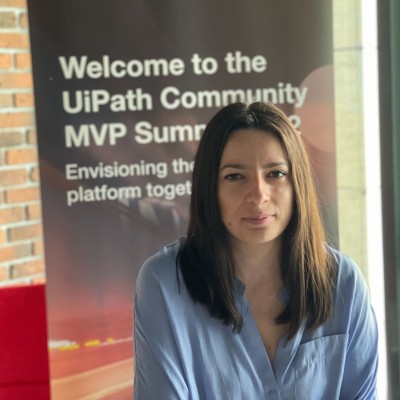Takeaways from the Automation Education Community Summit 2022

The Automation Education Summit 2022 brought together visionary educators, automation experts, and students that are shaping the future of education. For UiPath the commitment to invest in education and in the workforce of the future is a key direction. Our Co-CEO Rob Enslin ensured that the message was well received by the 1,300 attendees during the three days of regional summits.
Getting to learn from pioneers in higher education made the virtual summit fruitful for all the participants, and here are some of the takeaways that can inspire your work as a trainer or educator in the field: 1. Use the platform on your own as part of your learning and teaching: “The beauty of teaching RPA is when you're doing it yourself, in the first place, doing, doing, doing. Because it's not going to work by letting students do something and explore the RPA capabilities unless, and they're going to do it, and you have no clue what you're talking about. Challenge yourself by using the technology.” Christian Langmann, Professor, University of Applied Sciences Munich
2. Run hackathons and challenges that open it up practice and solutions: “We do multiple hackathons, depending on which company wants to come in and engage with our students. It's a good way for companies to engage, but at the same time students get more challenges to find in their skills, and then we wrap up the semester at the end of the class with the certification, and we have seen significant success with that. So, students love the fact that they can go from knowing nothing to being very confident with solving problems that can very well use UiPath as a tool.” Gaurav Shekhar, Professor, Program Director at The University of Texas at Dallas
3. Mix studies with internships and real-life projects to be automated: “Skilling is a very important aspect. We train the future of workforce, and our current students and in this respect, we started working with Academic Alliance and bringing the curriculum into our module into preparing students for final year projects through an internship by working very closely with the industry in this area of RPA.” Lim Boon Yang Vincent, Senior Lecturer, School of Engineering, Republic Polytechnic, Singapore
4. Get a mentor into automation or join a learning group to support your growth: “As an MVP I offered mentorship in various partnerships with universities. What would you be able to do as a student if you benefit from an MVP mentoring? You’ll get my fully support and engagement, and around the corner we'll start with the document understanding and process mining and lecture, for in a numeric week where I will be able to teach you automation.” Andreas Obermair, UiPath MVP, Global Head of Automation Roboyo
5. Get inspired by MVPs and automation experts and move towards those role models. “I started learning RPA with UiPath Academy and suddenly I started to automate the work which I was doing. In one year, I was directly working with the CFOs and CTOs of companies to grow their RPA knowledge. In two years of time, I was already an RPA leader and quickly moving as a COE Leader in the industry, all this together with being nominated as an UiPath MVP. Being an UiPath MVP offered me the ability to help a lot of people in the RPA industry and engage with the UiPath community, and a lot of students around the Academic Alliance to whom I shaped their careers.” - Nisarg Kadam, UiPath MVP, Automation Architect WonderBotz
6. Assess the right skills and needs to ensure you embark on the right learning plan: “Often, I say to Roboyo clients: a perquisite of implementing the right skills of automation is really conducting a very thorough learning needs analysis to define what your future state roles should be within your organization and conduct skills assessments to understand what those capability gaps are. This will enable the organization to create a taylored training program to support the growth of estimation, and that is all under the umbrella of upskilling and reskilling” - Mallika Govindan, Global Head of Learning Services, Roboyo
7. The networking rooms helped us share opinions and expand the base for a dedicated educator community. We heard the testimonials of the Visionary Educators and heard the story of Virginia Academic RPA Community of Practice (CoP) that helps public and private Virginia colleges and universities become acquainted, educated, and learn the power of software automation. An insight on how institutions can benefit from higher learning to be more effective and efficient, and build higher levels of student experience.
With all the inspiring talks, we also got to reveal key programs and functionalities that enhance the experience in the UiPath Community and strengthen the academic partnerships.
1. We addressed the need for continuous education and proof of skill through a dedicated platform for UiPath Digital Credentials, including badges and certificates. Through this platform the recognition of skill will be much easier, transferable, and trackable by any automation professional that gets UiPath certifications and awards.
2. The case of the first national qualification in RPA obtained in South Africa set the bar for expanding automation and RPA as an important milestone in other countries and regions. We look forward to collaborating with other pioneers in education to get similar accreditations and qualifications. For more information, our UiPath Academic Alliance representatives are open for dialog: academic.alliance-support@uipath.com.
3. The UiPath Academy and the entire large UiPath Community continue to be open and free to support access to qualitative education, competence development, and a sense of belonging in the vibrant automation ecosystem.
For more information and detailed insights, check the sessions in the UiPath Community YouTube playlist, Automation Education Summit 2022.
Keep up to date for upcoming events on the UiPath Community event page.
Corina Gheonea is a Director, Marketing Community and Loredana Ifrim a Marketing Community Manager

Senior Director, Marketing Community, UiPath
Get articles from automation experts in your inbox
SubscribeGet articles from automation experts in your inbox
Sign up today and we'll email you the newest articles every week.
Thank you for subscribing!
Thank you for subscribing! Each week, we'll send the best automation blog posts straight to your inbox.



